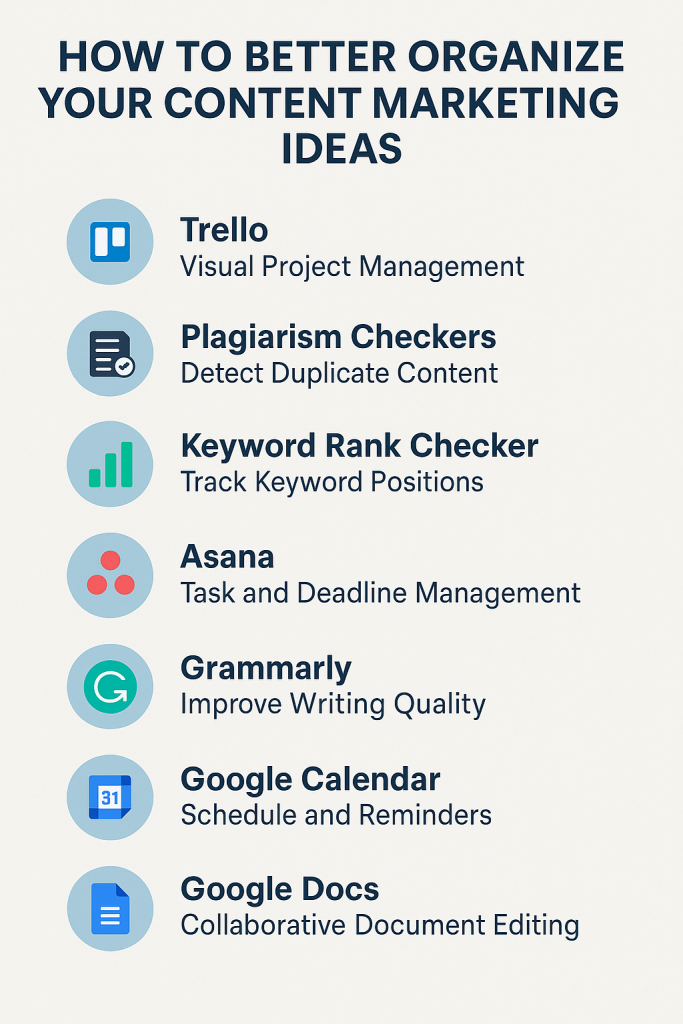In the hospitality industry, content is no longer just a ‘good to have’ activity. It is a tool for visibility, guest trust, hiring better people and growing your brand across markets.
But with so much going on in operations, hospitality recruitment and hospitality digital marketing, how do you stay consistent with your content ideas?
The answer is structure. Not motivation.
Here is a simple and practical list of 7 reliable digital tools to help hospitality professionals manage content more efficiently, whether you are a hotelier, a hospitality school, or a recruitment agency.

1. Trello – A Visual Way to Manage Content Plans
Trello helps you turn ideas into actions through a simple board system. You can plan your editorial calendar, blog posts, recruitment campaign updates, and more.
Benefits for hospitality teams:
- Create different boards for each property, project or team
- Track progress from ‘Idea’ to ‘Published’
- Add checklists, deadlines and owner names to each task
2. Grammarly – Improve Clarity in Hotel and Restaurant Communication
Grammarly is a simple yet powerful writing assistant. It corrects grammar, punctuation and improves your writing style, which is essential when dealing with international guests, online reviews or training materials.
It is trusted by over 30 million users worldwide.
🔗 Check Grammarly
3. Small SEO Tools – Check for Content Plagiarism
Original content builds trust. Whether you are writing job ads, blog posts or SOPs, plagiarism can negatively affect your online presence.
Use tools like Small SEO Tools Plagiarism Checker to verify authenticity.
Best for:
- Hospitality training content
- Chef bios or recipe write-ups
- Recruitment posts across job portals
4. Ahrefs Keyword Rank Tracker – Know What People Are Searching
If you are writing blogs or creating hiring campaigns, you must know which search terms people are using.
Ahrefs helps you:
- Discover high-ranking hospitality keywords
- Track the performance of published content
- Analyse competitors in your location or niche
Examples of useful keywords:
- Best hotel jobs in Dubai
- Hospitality internship in Switzerland
- Cruise line recruitment India
5. Asana – Manage Larger Content Projects Across Locations
If you are running campaigns in multiple properties or regions, Asana allows you to structure tasks, assign responsibilities, and view deadlines across your teams.
Features that help:
- Calendar view of all upcoming content
- Sub-task creation for detailed workflows
- Easy delegation to multiple departments (HR, marketing, operations)
6. Google Calendar – Plan Content Like a Revenue Manager
Google Calendar is not just for meetings. It is a smart way to plan blog posts, content launches, job postings, newsletters, and events.
How to use it:
- Set up a recurring schedule for different content types
- Share it with your team so everyone stays aligned
- Set alerts for seasonal campaigns or open positions
7. Google Docs and Drive – Collaborate Without Emails
Google Docs is the most commonly used tool for writing and editing content. It is perfect for hospitality professionals who work across departments or with external vendors.
Why it helps:
- Write, edit and comment in real time
- Store all content on Google Drive for easy access
- Use it for writing SOPs, training content, or blog articles
Sample Use Table – For Hospitality Marketing Teams
| Tool | Use Case | Hospitality Example |
|---|---|---|
| Trello | Blog content pipeline | Track “Luxury Weekend Packages – June 2025” |
| Grammarly | Hotel communication materials | Correct guest emails and spa menu writeups |
| Ahrefs | SEO research and tracking | Rank for “Hospitality jobs in Maldives” |
Final Word
If you want to grow your hospitality brand and reach the right audience, structure your content creation process. Use these along with other digital marketing tools for hospitality. Start by picking any two tools from the list and commit to using them weekly. Let consistency, not chaos, drive your content calendar.
There is no magic. Just clarity, simplicity and the right tools.





